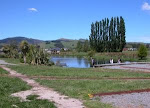In this post, I will talk about how we as a community create commons and how we might create more.
As we come through this period of lockdown, it is becoming clear that many of the things that we might think of as individually owned are actually often part of a commons. Our health is an example - Maintaining the health of people who already face health issues turns out to require collective action. Likewise, our collective work (which many of us haven't been able to do during lockdown) creates and maintains our economy. In many different ways we rise and fall with those around us in our community.
Our capacity to work together and pool resources is a superpower that we can learn to use more! Our collective adherence to lockdown has halted the spread of the Corona Virus that has overwhelmed health services and led to people being buried in mass graves in other countries. Our capacity as a nation to do this has made a huge difference to the quality of life and death in this country at this time.
Now we need to use that same superpower to recreate an economy that supports all of us. And we can help with that, like other communities through history, by creating and maintaining our commons.
Some examples of the sorts of commons that communities have created include:
Food commons:
Community gardens and similar are an obvious example of this. Incredible Edible Todmorden is another example as you can see in the video below.
Alongside this, it is good to have ways for people to share or swap any surplus, and/ or to learn new skills associated with preserving food.
Financial commons:
For most of us, our money and the way we manage it is something none of us talk about and that we do in a very individual way. That means we never learn anything new and we are confined to what we can do as individuals. This doesn't have to be way it is!
A growing number of people around New Zealand are working together with people they know (families, groups of friends, groups of neighbours) to help each other save, and to pool resources so that they can do things like:
- Helping each other cover unexpected costs like having to go to the doctor or fixing a car or a house.
- Helping members to pay off highly expensive credit card debt (and save on the huge interest that credit card companies charge when you don't pay in full each month)
- Investing in resources that might save money that could be then reinvested in saving for similar resources - eg funding electric bikes (which save heaps on car running) or electric cars (which save on petrol costs).
- Helping with funding to set up a new business.
Sharing
These kinds of pooled resources don't have to be money - Some communities are setting up sharing schemes that might work a little bit like cheap hire schemes but where members can borrow or rent anything from cars from a shared pool, tools, kitchen equipment, craft equipment or whatever members are interested in. This can save people a huge amount of money and yet provide good access to the sorts of resources people might only need from time to time.
Cooperatives
These are another way people have joined together to help their members by sharing costs and profits while also providing goods and services. You can find out more about these on the Living Economies Website
These are just a few examples of the kinds of commons that may be useful particularly in economically tough times.
If you have found any of this interesting check out this NZ doco which provides some examples of the things people are doing and have done around this stuff.


No comments:
Post a Comment